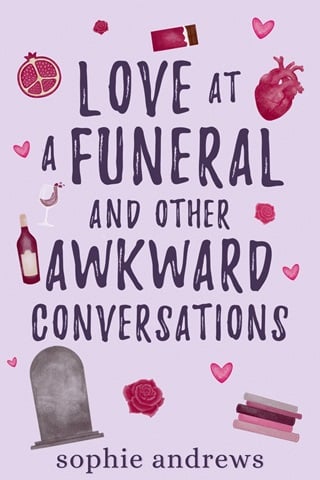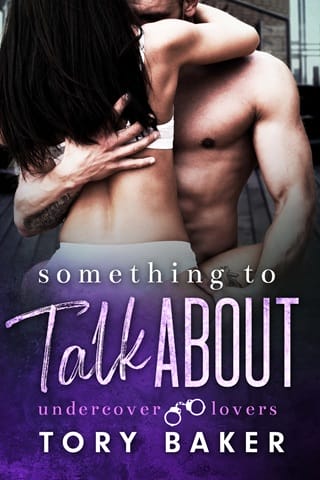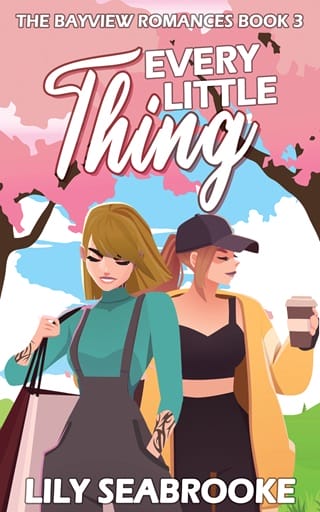Chapter 31
Inever took stock in making resolutions, but it’s a new year, a new me. On January 1st, I sat down to write a list of goals, and maybe it’s my start of morphing into my mother—I don’t know—but it felt good.
Meet with Dad. Do not take no for an answer.
See Lucy and Lara at least once a month. Read books with them.
Buy a paper calendar and make note of birthdays.
People like birthday cards, buy them.
Write a book.
Tell the people you love that you love them.
So far, I’ve crossed off number four, but it’s only the second week of the new year. For someone who doesn’t usually follow through with a plan, I’m doing pretty well, particularly since I’m about to cross off number one.
Arguably, the toughest one.
With my laptop open on the train, I take my mind off the nerves I have about seeing my dad by working on the book.
I’d started journaling daily at the suggestion of Maryanne. I tried to argue I already have my posts, but she insisted I needed to document my day-to-day life as a way of observing growth. At first, it felt kind of immature, like a little girl writing in her diary. But after a few days, I ended up looking forward to it. It’s become a form of meditation, to inventory my day, digest it, and then let it go.
The thoughts that most often shaped my days weren’t about my brother or family. They were mostly about missing Vince. Or sometimes about Dale, the guy who works next to me, who is the actual worst. Him and his sunflower-seed crunching and constant sniffling. Get a tissue, Dale!
Looking back over the last few weeks, I found a story of struggle and progress. Along with my social media posts, I wrote an outline for a book. It’s part memoir, part advice column, and hopefully something people could commiserate with or find humor in. I’m almost like a real adult, all because my brother died. Or, maybe, in spite of. I’ll never know, but I am grateful the roller coaster has slowed down for now, and even more grateful that Raymond St. George rode with me for part of the way.
I work through a few notes a critique partner gave me in the time it takes to get to Penn Station, and I load everything up in my purse. The memory of the last time I was here is still fresh in my mind, even though it seems like ages ago. So much has changed in so little time. For a while there, my life was frozen, but recently, my days are moving like dog years. Playing catch up, maybe.
It’s cold, and I wrap my scarf almost all the way up to my eyes to guard against the wind whipping between the skyscrapers. I scurry up the ten or so blocks, passing the Empire State Building on the way, and it reminds me of the one time I went to my father’s office for Take Your Kid to Work Day. I was ten and spent most of the day with his secretary, but after he finished, he took me up to the top of the Empire State Building and then bought me an ice cream cone. Besides the fact that he’s top management of a global accounting firm, I don’t know much more about what exactly he does.
When I arrive at the tall, silver building on Lexington, I hope I’m not turned away. I didn’t call ahead or make an appointment because I don’t want to give him the opportunity to make an excuse, but the man at the front desk barely takes his eyes off the video on his phone as he signals me on after I sign in.
It’s the middle of the day, and the elevator is blessedly empty, allowing me time to silently freak out. I wiggle my hands before wiping them on my pants. I’m sweating, and I remove my hat, coat, scarf, and gloves, holding them all on my arm, which doesn’t make me sweat any less. When the elevator doors open again, I trip and drop everything on the floor.
“Whoops, sorry,” I say when someone steps around me as I pick up my gloves and hat.
“Cassandra? What are you doing here?”
I wing myself upright, thrown off my mental game. I practiced what I wanted to say to my father, in the tone I wanted to say it in, but he takes me by surprise now, and I let out a startled, “Hi.”
Dad’s arched eyebrows and flapping chin tell me he’s dumbfounded too. “Why? What…? Why are you here?”
I get myself together, stand taller, and answer, “I came to talk to you.”
He lifts his arm to peek at his watch. “It’s two in the afternoon on a Thursday. You need to talk now?”
I shrug. “No better time than the present.”
He rolls his eyes at me but doesn’t move. The elevator doors can’t close with us at this impasse. “You know this is where I work, right? You can’t simply come here whenever you please.”
I don’t apologize or move. I’m not going to. I came here to talk to him, and I will.
After a short standoff, he relents with a sigh. “Fine,” he grunts, checking his watch again. “I have a meeting in ten.”
He spins on his heel, out of the elevator and down the hall. His strides are so long, I have to hurry to match his steps until he stops at the end of the hall to open a door with his name next to it: Stephen St. George, Director, Analytics.
I tap on the sign. “Fancy.”
He ignores me and sits down in the black leather chair behind his desk, reclining slightly, his hands folded across his stomach, a power pose.
It’s been months since I’ve seen him, and not much has changed, except maybe a few gray hairs. His suit is cleanly pressed, and he doesn’t smell like alcohol…yet. It makes me want to take a stab at him. “Divorce looks good on you.”
His chair creaks as he sits up. “You came here to poke the bear?”
I huff. “It hasn’t worked with you so far.”
He leans forward on his desk like he’s going to negotiate with me. “Still you continue.”
“Mom says my stubborn streak is from you.”
“Hm.” He wipes one hand over his mouth and chin, gazes down and then at the wall behind me before meeting my eyes. “How’s your mother?”
“Settled in the condo.”
“Good.” He fiddles with his tie, and I know from recent experience I don’t have much more time with him being uncomfortable—able to be cracked open—before he changes back into the bear he is. I have to go for it.
“I’m sorry about what happened that day,” I start, knowing he’ll understand I mean the day I lost it on him and Mom. “I’m not sorry for telling you how I feel, but I am sorry how it came out. It wasn’t the right way to express myself.”
He casts his eyes down again, and I wait for him to say something. He doesn’t utter a word, doesn’t even let out a breath.
“I’m trying to…make amends, I guess.”
No response.
If he’s not going to interact with me, I’m not sure what else to say. In all of my rehearsals, I didn’t plan for silence.
“I think, um, I think we’re all pretty messed up from Ray’s death, and we need to grieve in whatever way we have to, but I’m tired of fighting with you and Mom. This is hard enough as it is.”
He blinks his gaze up to the ceiling. His throat works on a swallow, and when I think he’s going to speak, he doesn’t. Instead, he wipes at the corner of one eye before tilting his head toward me, waiting for me to go on. The quiet show of emotion dents the armor around my heart. He’s not a robot.
I wonder what it is he’s thinking right now, but he’ll never tell me. I wish he would.
“You and I never got along, and it’s okay,” I acquiesce, working on that particular understanding for weeks with Maryanne. It’s been challenging, to say the least. “I wanted to come talk to you to see if we could move forward, maybe create some kind of relationship that’s different from what we had. Better.” I clear the lump from my throat. “Unfortunately, I’m the only kid you have left, so it’s me or nothing,” I say, forcing my voice to be light and teasing.
His face is blank. He doesn’t think I’m funny.
“So, what do you think of…my offer?”
He considers me, picks up a pen, then promptly sets it back down before stacking some papers. “Yeah, sure.”
I perk up. “Yeah?”
He tips his chin toward his door. “Talk to Lisette for my schedule.”
“Oh.” I know what that means. It’s a brush-off. It’s an I’ll call you after a first date. My own father’s ghosting me.
“Welp.” I leave the bag of Ray’s belongings I brought for him on the floor. “We saved these for you, if you care.” I don’t want to expend one more second of energy on this man and pivot to leave, but on the way out, my eyes snag on a picture. It’s a framed 8 x 10, placed in the middle of his floor-to-ceiling bookshelf. I stop to admire it.
It’s an old family photo. The four of us on the boardwalk at the beach. Mom and Dad stand behind Ray and me, and I must have been eleven or twelve years old at the time. We’re all smiling. Dad has on a tattered baseball hat, and Mom’s wearing a neon-green top. Ray’s nose is all freckled, his hair shaggy and curling at the ends, while I’m sunburned, my fingers up in a peace sign. We look truly happy.
“It’s my favorite,” Dad says gruffly behind me.
I turn over my shoulder to find his attention is on his computer screen. I’m not sure what to make of the statement or the fact that he even has this picture up. Just when I think I can hate him, I can’t, though he doesn’t raise his eyes or make a move to me, so I see myself out.
As Lisette types away on her keyboard, she glances up to offer a friendly hello. I wave at her. I’m not going to bother checking my father’s schedule. If he really wanted to work on our relationship, he could tell me his schedule himself or, hell, offer up any other idea.
I stick my arms through my coat and begin to put on my scarf when my dad calls out from his office, “It’s good to see you, Cass.”
His head poking out from his door reminds me of Ray with the way it’s cocked to the side. He offers a flat, closed-lip smile, and I guess it’s better than nothing. Like Maryanne told me, I don’t know what he’s going through. I can’t control what he does, but I can control my reaction to it. I change my mind and make an appointment with Lisette before heading to the elevator and back outside to the subway entrance so I can travel uptown.
Professor Row agreed to meet me at a diner in Harlem, and I arrive early to get some writing done. With a steaming cup of coffee and my laptop open, I pour my emotions from the last hour onto the page. My fingers fire across the keyboard, a steady staccato, my hands typing the words before they’re even fully formed in my mind.
I didn’t think I was allowed to grieve, I write. Faced with an incredible loss, everyone goes through the same emotions. The sadness, anger, denial, it’s all the same, really, but I didn’t think I was permitted to experience those things when my brother passed away.
I don’t have children. I don’t know what it’s like for my child to die, but I witnessed the suffering of my parents. They both bore that worst-nightmare scenario physically. They still do. The evidence is in the lines of their faces, the gray strands of hair, the hunched shoulders. My brother stole a piece of me when he died, so what must it feel like for them? Their whole self dying? It has to be terrible for them, I thought. More terrible than it is for me.
I’m not married and don’t know the intricacies and nuances of marriage, but if what I feel for the person I love is any indication, losing your partner must take the wind out of your sails. I suppose it might be like you’re a boat stuck in the ocean, endlessly floating, not steered in any particular direction. To go from having daily routines, inside jokes, and support to suddenly nothing—it must be terrible, I thought. More terrible than what it is for me.
I’m a fully grown adult—sometimes—with the ability to comprehend complex ideas. I don’t need my father or mother to hold my hand anymore, not like little kids who lose their parents. The innocence of a child shouldn’t be interrupted by something so dismal as death. I think of all my twin nieces are missing by not having my brother around. Because they’re so young, I hope they’re somewhat shielded from the emptiness inside, but when they get older and my brother isn’t there, what will they feel then? When he’s not there to teach them to drive a car, take a picture at graduation, walk them down the aisle at their weddings, or for any other day, special or not, that he isn’t there for. I’m sure they’ll be quite familiar with the missing link in their life and family. And it must certainly be terrible. More terrible than what it is for me.
My brother and I were level, in a way. We had always gotten along, we were great friends, and there was nothing left unsaid between us. I felt like my loss wasn’t as big as everyone else’s. I saw the relationships my brother had with others as more important than mine. Therefore, I couldn’t grieve. I didn’t deserve to. I thought I needed to be strong for everyoneelse. But by putting others’ grief ahead of my own, I unintentionally made it worse for myself. I self-destructed. And, sadly, I think it may be true for a lot of people who experience the death of a sibling. The putting others ahead of yourself, not the self-destructing part.
What you experience with your sibling during your time together can span from black eyes to fits of laughter to screaming matches to “Hey, give me five bucks for a beer.” The connection between siblings is established from birth, and even though it can often be tenuous, it’s undeniable. We may not be burying our parents, children, or spouse, but our loss is just as great. Different, but significant. It’s a pain that deserves moments to say, “I’m not okay.”
I’ve learned it’s okay not to be okay, and we need to take time to heal. Otherwise, we’ll be useless to those people we think we need to help in the first place. Take time to scream into your pillow, cry, or get drunk in public, whatever works for you. Although, I would suggest avoiding anything where you might end up puking on a train or waking up in a jail cell.
 Fullepub
Fullepub 



